Therapy for Adoptive and Foster Families
Here help your child experience connection and healing
Do I belong?
Why didn’t I end up in this family?
Will I ever get to meet my biological family?
These are all questions foster youth and their families grapple with throughout a placement or adoption process. Internally, a struggle to connect and trust others can make feeling like they belong in their new family, new friendships, or new school nearly impossible. This struggle to connect or trust others might be expressed by big behaviors like tantrums or yelling. Sometimes, especially with teenagers, these behaviors become riskier, such as experimenting with substances or unsafe driving.
Foster and adoptive parents find themselves feeling helpless, wanting to help their children feel like they belong but having no idea how to do it. Often, they feel overwhelmed and unprepared for how to respond to their child’s behaviors. They don’t want to contribute to their child’s wounds, but they also know that these behaviors can’t continue.
Your foster or adopted child might find themself:
Feeling disconnected and distrustful of their new family
Struggling to express their emotions in safe and healthy ways
Grieving the loss of family and friendships
Struggling to form healthy relationships with friends and family members
Navigating their racial identities in the context of their foster/adoptive families
As a foster or adoptive parent, you might find yourself:
Feeling overwhelmed by the conflicting information you have gotten about how to respond to your child’s behavior
Recognizing that many of your child’s behaviors are related to their trauma history but feeling uncertain about how to respond
Resentful that the transition to your family hasn’t gone as smoothly as you expected
Feeling pressure for every interaction with your child to be "perfect"
At Bud to Bloom Play Therapy, our therapist help foster and adoptive families by:
Using play to foster connection and trust between parents and children
Using play to allow children to process and tell their unique stories
Using play to heal trauma
Educating caregivers about the unique needs of children who have been adopted or in foster care
Teaching and practicing new communication skills to express their needs, emotions, and concerns
You might feel hesitant to bring your foster or adoptive child to therapy because if you suggest therapy to your foster child, they will feel like they are being punished, rejected, or not like the rest of the family.
The truth is that the right therapist allows your child a connective and playful experience where their emotions and behaviors don't lead to rejection but opportunities for a deeper connection. We want to bring the joy and connection back to parenting your child.



